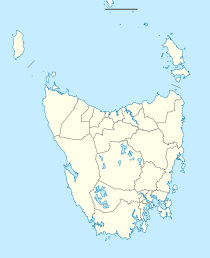Dover, Tasmania facts for kids
Quick facts for kids DoverTasmania |
|||||||||
|---|---|---|---|---|---|---|---|---|---|
| Population | 486 (2016 census) | ||||||||
| Postcode(s) | 7117 | ||||||||
| Elevation | 17 m (56 ft) | ||||||||
| LGA(s) | Huon Valley Council | ||||||||
| State electorate(s) | Franklin | ||||||||
| Federal Division(s) | Franklin | ||||||||
|
|||||||||
Dover is the southernmost town of its size in Australia, located on the western shores towards the southern end of the D'Entrecasteaux Channel, just south of the Huon Valley, southwest of Hobart, located on the head of Port Esperance in Tasmania. It has a population of 486; 91% were born in Australia and 5% was born in United Kingdom, with other less common origins such as New Zealand, Germany and Greece all clustering around the 1% mark.
Etymology
First recorded in its Latinised form of Portus Dubris, the name derives from the Brythonic word for waters (dwfr in Middle Welsh). The same element is present in the towns French (Douvres) and Modern Welsh (Dofr) forms.
History
The place name of Blubber Head, at the northern entrance to Port Esperance, may indicate shore-based bay whaling activity took place at the location in the 19th century.
Port Esperance Post Office opened on 6 February 1856 and was renamed "Dover" in 1895.
In 2013, the Dover Hotel pub/tavern was destroyed when it was engulfed by a fire.
A fire on the night of 23 April 2020 destroyed the Port Esperance Sailing Club's building. This triggered a response from the wider Tasmanian community and beyond to build a new clubhouse. These efforts led to a clubhouse that opened on 17 March 2024. While the basic building is usable and many of traditional community activities have resumed, the cost impacts of COVID-19 mean a number of the clubs facilities wait to be undertaken. Documented club activities date back to an 1858 Regatta, possibly earlier.
Climate
Dover has a marine climate (Cfb) with consistently cool, cloudy weather all year round. Despite its southerly latitude and low maximum temperatures, snow and frost are uncommon in winter, however sleet is an occasional occurrence. The highest recorded temperature in Dover was 40.1 °C (104.2 °F) in March 2019, over 20 °C above the March average maximum.
| Climate data for Dover (1991-2020, extremes 1901-2022) | |||||||||||||
|---|---|---|---|---|---|---|---|---|---|---|---|---|---|
| Month | Jan | Feb | Mar | Apr | May | Jun | Jul | Aug | Sep | Oct | Nov | Dec | Year |
| Record high °C (°F) | 39.6 (103.3) |
36.8 (98.2) |
40.1 (104.2) |
30.9 (87.6) |
25.2 (77.4) |
18.9 (66.0) |
18.5 (65.3) |
22.6 (72.7) |
27.7 (81.9) |
31.9 (89.4) |
34.2 (93.6) |
38.0 (100.4) |
40.1 (104.2) |
| Mean daily maximum °C (°F) | 21.1 (70.0) |
20.8 (69.4) |
19.5 (67.1) |
17.0 (62.6) |
14.7 (58.5) |
12.6 (54.7) |
12.3 (54.1) |
13.1 (55.6) |
14.8 (58.6) |
16.4 (61.5) |
17.9 (64.2) |
19.4 (66.9) |
16.6 (61.9) |
| Mean daily minimum °C (°F) | 10.4 (50.7) |
10.2 (50.4) |
9.0 (48.2) |
7.2 (45.0) |
5.7 (42.3) |
3.9 (39.0) |
3.5 (38.3) |
3.9 (39.0) |
5.0 (41.0) |
6.4 (43.5) |
7.9 (46.2) |
9.1 (48.4) |
6.9 (44.4) |
| Record low °C (°F) | 3.1 (37.6) |
2.6 (36.7) |
1.9 (35.4) |
−2.0 (28.4) |
−1.5 (29.3) |
−2.0 (28.4) |
−3.4 (25.9) |
−1.8 (28.8) |
−2.1 (28.2) |
−0.5 (31.1) |
0.8 (33.4) |
1.2 (34.2) |
−3.4 (25.9) |
| Average precipitation mm (inches) | 52.5 (2.07) |
50.4 (1.98) |
63.0 (2.48) |
66.3 (2.61) |
73.3 (2.89) |
79.0 (3.11) |
86.9 (3.42) |
91.8 (3.61) |
82.8 (3.26) |
86.1 (3.39) |
71.8 (2.83) |
70.3 (2.77) |
877.5 (34.55) |
| Average rainy days (≥ 0.2mm) | 11.6 | 10.7 | 12.9 | 14.4 | 16.1 | 15.8 | 18.7 | 18.3 | 17.4 | 17.4 | 15.4 | 14.3 | 183 |
| Average relative humidity (%) | 59 | 60 | 61 | 66 | 69 | 73 | 71 | 66 | 63 | 62 | 62 | 59 | 64 |


